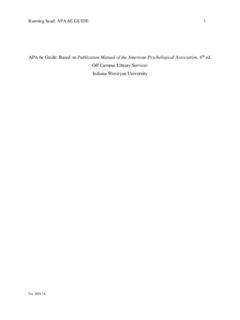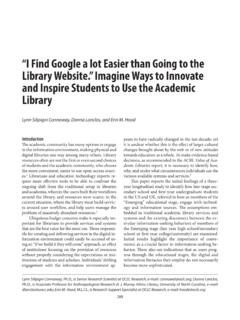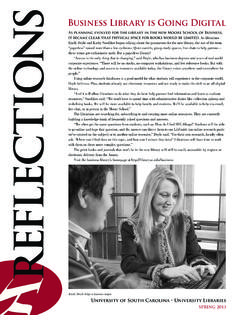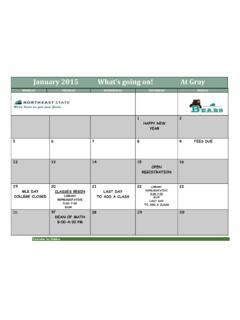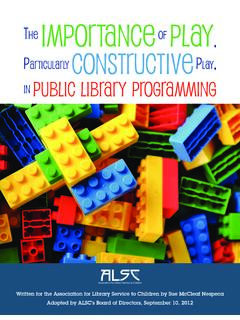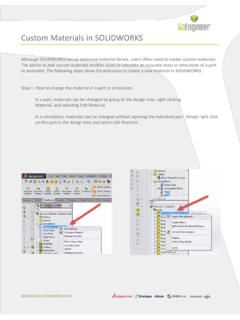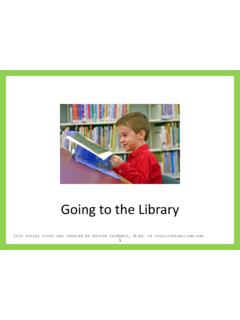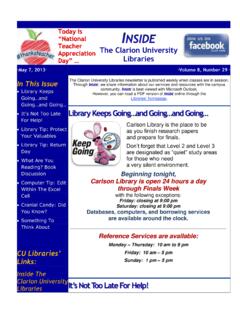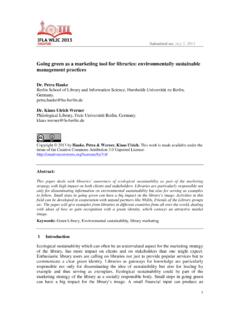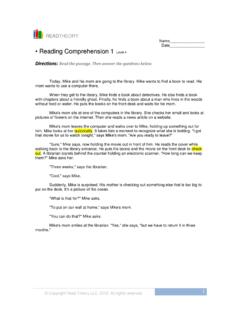Transcription of OCLS Orientation
1 ~ 1 ~ OCLS Orientation Part A: OCLS Orientation Do you remember going to the library as a child and enjoying the pleasure of opening up a book and losing yourself in a story? There were so many books to choose from that it was hard sometimes to take out only what you were allowed or could carry. Reading those books opened up new worlds, places you would never see and ideas that were just make-believe. The library allowed you to have books that perhaps your family could never afford. As a college student, libraries can still do the same thing for you, but your reading may not be about princesses and princes or famous sports figures.
2 It may be about faraway places or ideas that are new to you. Libraries for academic research allow you access to books, media and articles that help you to learn about the important concepts necessary to be a successful student. Libraries have changed a lot over the years. Not too many years ago, a library had a card catalog that was drawers upon drawers of 3 x 5 cards that helped you to find your books. Card catalogs are long gone. They are replaced by online public access catalogs (OPACS). This is a fancy term for a database of all the materials owned by the library that are available electronically. Using a computer allows you to find what titles are available and where they are located in the library .
3 Almost all of these databases are available via the Internet so you can sit at home and see what books your local library has on a particular topic. Now we have the added advantage of accessing many books electronically. This means they are fully available from cover to cover simply by clicking a few buttons on your computer. Some are behind subscription databases and some are freely available. Previously, to find articles, you had to use an index. These were books that had lists of article citations categorized by subject, author and title. Now all that index information has been transferred to databases that allow searching by the same ways, but also a lot more, like by title, keyword, date, etc.
4 These electronic article indexes are also available over the Internet. We call them library databases. Some common examples are Academic Source Premier; Business Source Complete, et. Since the library in our case the university has to pay a vendor to get access for its students, each library has to create a way to authenticate its own users. So all of the article indexes that IWU provides require an authentication process for access. For almost all of the article indexes you will need to use, IWU allows multiple ways to authenticate. The primary way is the same as the access you use to get to the MyIWU portal and eventually your class.
5 One tip on this access is to not use the full email. Instead, only use your Some of you may additionally have numbers associated with your username. Stop just before the @ symbol. A second or alternate method requires the use of a 14-digit library access number that is assigned uniquely to each person. This comes either by an email from Off Campus library Services or you may eventually get an actual ID card, especially if you are an onsite student. Just be sure to only use one method! Finding good articles and books for writing papers, discussing new topics, or putting together a big project will allow you opportunities to explore the IWU library .
6 Knowing your way around will make your research a fun challenge as you try to find good research material for ~ 2 ~ your various assignments. We will learn about some of the resources that will be most helpful to you as a student. You will also be learning skills and knowledge that will stay with you the rest of your life. Introducing Off Campus library Services Indiana Wesleyan University strives to provide you with quality library services even though you may never enter the doors of Jackson library . Off Campus library Services (OCLS) offer you mediated access to professional librarians, academic resources and services that allow you to be a successful student.
7 OCLS can be reached by an 800-phone number (1-800-521-1848), email ), or live chat (9-5, Monday-Friday). Office hours for OCLS are 8 to 8 , Monday through Thursday; 8 to 5 , Friday and 9:30 to 2 Saturday, and voice mail is available 24 hours a day, 7 days a week. You can always leave a detailed message explaining what it is that you need. You can also email us at A further note about Saturday hours is that we offer limited service on Saturdays. Some requests will have to defer until Monday. PART B: Making the Research Process Work for You The Research Process One of the competitive measures that companies and employers use in this day of the Internet and instant global access is the ability to collect information that will give their organization some kind of competitive edge.
8 In this lesson you will learn how to do research, where to look for discipline specific research and how to organize that research information into coherent presentations. Our goal for this lesson is to learn about the process of doing research. Later you will be introduced to some of the premier databases, library catalog and Internet sites that will make your research process possible. Identifying Internet web sites requires evaluating critically the information you are considering to use for your research. Let's begin by looking at the research process. Understanding the research process actually helps you to maximize your time as your prepare to write papers and make presentations.
9 Here are the basic steps to completing a research project. It might end up in a paper, a PowerPoint presentation or a class presentation. 1. Define your search topic; construct a working thesis. 2. Gain a general overview and perspective of your topic. 3. Decide how your topic should be searched - the reference resources, indexes, and subject headings needed. 4. Locate the citation information to likely documents. 5. Locate the documents. 6. Scan the documents to gauge their usefulness to you. 7. Read and take notes on your selected sources. 8. Repeat steps two through seven if a new topic has occurred to you in your research. 9.
10 Revise your thesis statement to correlate with your actual research materials retrieved. 10. Create an outline or concept map to provide a skeleton organization to your paper. 11. Begin writing or preparing for the presentation. 12. Correctly cite in text and in your list of references (bibliography) any sources that you take ideas from to include in your paper. ~ 3 ~ Using Boolean Searching One of the steps you read about was the preparation of a working bibliography. You can certainly use the Internet as a means to access many resources. Libraries provide journal or periodical indexes. These indexes are the BEST way to identify appropriate sources for your research.
